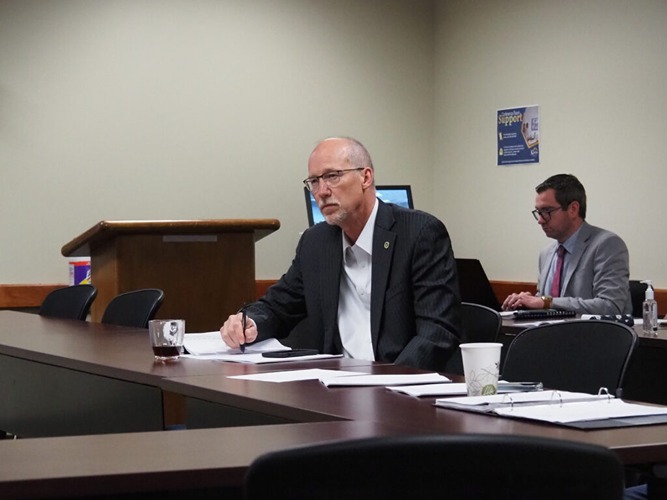By Tim Carpenter, Kansas Reflector
TOPEKA, Kan. — The state’s six public universities recommended Wednesday the Kansas Board of Regents authorize tuition increases ranging from 5% to 7% in the upcoming school year to counter inflationary pressure and limited success with requests for new funding from the Legislature.
Two-thirds of these institutions — Kansas State University, University of Kansas, Emporia State University and Pittsburg State University — requested a 5% boost in tuition assessed resident and nonresident undergraduate and graduate students. Wichita State University proposed a 5.9% hike for students, while Fort Hays State University opted for a 7% increase.
The last systemwide surge in tuition at these state-supported universities occurred in 2019. Those pre-COVID-19 adjustments ranged from 1.1% to 2.8%. KU didn’t amend tuition rates during the past four years, Board of Regents documents show, but each of the five other universities implemented one tuition increase in those intervening years ranging from 1.2% to 3.8%.
The Legislature, concerned about affordability of a public education, for several years appropriated millions of dollars to replace revenue the universities otherwise could have been acquired through tuition adjustments. The 2023 Legislature declined to allocate about $25 million sought by the Board of Regents to address inflation, which theoretically could have been used to moderate tuition increases.
Blake Flanders, president and chief executive officer of the Board of Regents, said the nine-member board would take final action on the 2023-2024 proposals in June.
“I know the universities have had significant pressure due to inflation in almost every commodity across the board, including high inflation in utilities,” he said. “The number one priority for the board has been affordability in terms of our tuition.”
Here are the per-semester, full-time undergraduate student tuition amounts assuming the Board of Regents approved requested increases: KU, $5,298, up $252; KSU, $4,981, up $237; WSU, $3,623, up $201; PSU, $3,064, up $146; ESU, $2,770, up $131; and FHSU, $2,218, up $145.
Ice, Winter thoughts
Board of Regents member Carl Ice, a graduate of K-State and appointed by Democratic Gov. Laura Kelly, said the state universities might have raised tuition in the 2022-2023 academic year had the Legislature not issued a directive blocking blocking increases.
If the Board of Regents rejected the latest tuition recommendations, Ice said, each university would have to retool their budgets to account for the collective loss of approximately $25 million that would have been generated through alteration of the rates.
“It’s a big deal. We’re talking about millions and millions of additional dollars,” said Wint Winter, a Lawrence member of the Board of Regents appointed by Kelly and a graduate of KU.
Winter said the decline in the college-age population left U.S. universities with the choice of coping by slashing expenditures or engaging in aggressive programs to recruit students. It mattered how students, donors, legislators and the governor viewed the tuition issue, he said. There were signs each of those constituencies had a shared interest in pushing against enrollment trends and striving to make the six state universities better, he said.
“In my view,” Winter said, “students, the governor and Legislature, donors all are sending signals that the evidence is they support a more aggressive approach.”
Bella Price, student body president at Emporia State, said the 5% increase sought by the ESU administration was reasonable given that some students were supportive of a 6% hike.
“We didn’t want to put too much pressure on students,” Price said.
ESU officials said the 5% increase in tuition would generate nearly $1 million, but that had to be considered in light of a projected 5% enrollment decline that would eat into tuition revenue during the upcoming school year. In fact, Board of Regents documents indicated ESU anticipated collecting $3 million less in tuition next academic year than it did in the current academic year.
Linton, Girod weigh in
K-State president Richard Linton and KU chancellor Doug Girod said fundamental operating costs had increased along with consumer inflation. The public universities in Kansas required additional resources to deal with those costs and to meet needs of recruiting and retaining personnel, Linton said.
Linton said a 5% increase would leave K-State among the most affordable land-grant universities in the country. Girod said the 5% adjustment would place KU in the middle of the pack in terms of tuition at public universities in the Big 12 Conference.
Girod said inflation during the past five years climbed 20%, but KU endured that reality without tuition increases, in part, due to decisions that cut about $40 million from the budget.
“We’ve just kind of eaten it to try and maintain affordability,” Girod said. “We’re just kind of at a point where we need to meet inflationary expenses.”
Doug Ball, chief financial officer and vice president for administration at Pittsburg State, said the university would combine a 5% increase in tuition with approximately $2 million in budget cuts or reallocations.
He said a 9% increase would be required to cover shortfalls tied to inflation and compensation. If the university’s 2.5% tuition increase in 2021 were combined with the proposed 5% in 2023, he said, the average over the five-year period would be a modest 1.5%.


















































